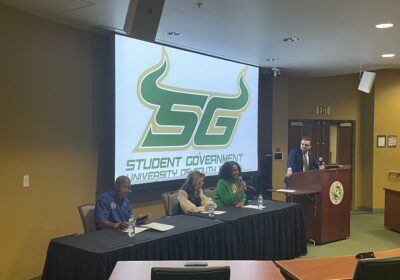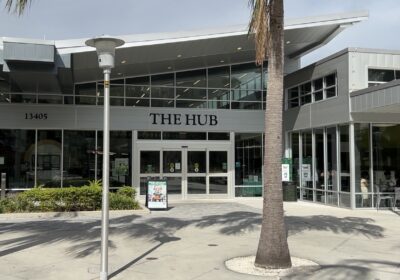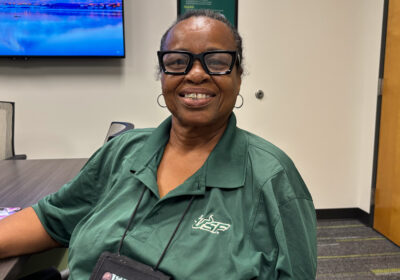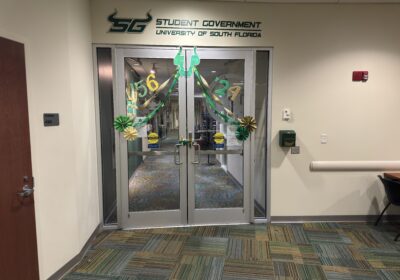Emails, open letters, tweets from USF sexual assault survivors portray lack of action from university officials

Although university officials launched an inquiry July 1 over the recent sexual misconduct allegations and said they will be surveying campus culture, environments and patterns based off the inquiry, emails exchanged four years ago between a former student and USF Dean of Students Danielle McDonald questioned how USF handled cases of sexual violence. The student said the same questions persist today.
The emails, exchanged between 2016 and 2017 and posted on the USF Survivors Twitter account on July 6, addressed sexual assault cases while also demanding action from the university after sexual violence allegations emerged.
“This is a huge, prevalent problem on campus and maybe one or two people coming forward about it it’s not important enough for them to say anything about, which is maybe what was happening in 2016 and 2017,” Sarah Zaharako, a former student and author of the emails, said in an interview with The Oracle. “I hope that they actually take people seriously now because now you have hundreds of women coming forward and men too.”
Zaharako said she started having meetings and exchanging emails with McDonald in 2016, during her freshman year.
The first email was sent on Oct. 14, 2016, after a 16-year-old girl was raped while unconscious at a party in the Zeta Eta chapter of Pi Kappa Phi’s fraternity house. Dillon LaGamma, a member of the fraternity and former student, was arrested and charged with sexual battery of a child over 12 and the fraternity was temporarily suspended after his arrest. In the email, Zaharako claimed the university did not issue a formal statement or send a crime alert to students about the case.
“Instead of being informed of this incident directly by USF Tampa administration, I was informed by this event via public news outlets,” Zaharako said in the email.
With no response from administration, Zaharako started an email blast campaign to call attention and demand a response from the university addressing the rape case.
“We started an email blast campaign because we realized the only time that they would answer us was if their inbox was completely flooded with emails,” Zaharako said.
After being persistent, Zaharako received a response from McDonald on Oct. 15, 2016. However, she said the response was “very generic” and contained an outdated link to access the Annual Security and Fire Safety guide, which included the 2016-2017 crime report.
In the email, McDonald said the University Police would send crime alerts when there’s an “imminent risk to the community.” With LaGamma’s arrest and the fraternity’s suspension, she said there wasn’t an ongoing risk to campus from this incident.
In regard to issuing a university statement, McDonald said “the university cannot comment on the status of the allegations since it is considered part of the educational record and therefore protected by the Federal Education Rights Protection Act.”
As of July 7, McDonald did not respond to emails from The Oracle to address the correspondence between her and Zaharako.
In 2017, Zaharako sent an email on Feb. 8 addressing the “rape culture on campus” after a student in the Department of Women’s and Gender Studies was accused of rape. This time, Zaharako said she didn’t send email blasts in order to protect the survivor’s identity.
“The fact that the department was not informed of this and his name has to be kept secret is appalling to me and my peers,” Zaharako said in the email. “I feel as though this needs to be addressed by university officials and a statement needs to be made by Judy Genshaft herself to show that [the university is] invested in the students and not just your pocket books.”
McDonald replied on the same day to schedule a time to meet. During the meeting, Zaharako said she addressed how the survivor felt unsafe and how the university should take action, including notifying faculty within the department and making changes in the survivor’s class schedule to ensure her safety.
Zaharako said she believes the university didn’t publicly address the sexual assault and rape cases as a way to prevent “bad publicity” as the university was working toward achieving its current preeminent status.
“This is happening on every college campus,” Zaharako said. “It’s not just us, but we are trying to let them know that they could be at the forefront of this movement. You could stand with your students and make people feel comfortable and make sure that you’re doing something about it, but it’s like you’re turning a blind eye because you want to make sure you have a lot of money in your pocket.”
On May 2 of the same year, another email campaign was sent out to address the case where former football player LaDarrius Jackson was accused of raping a student in her dorm room on May 1. Jackson was arrested and charged with sexual battery and false imprisonment.
She said in the email how the university “failed” to send crime alerts as well as a follow-up response to address the recent rape case.
“This has happened before and USF only seems to respond when they get a flood of emails putting pressure on them to address in,” Zaharako said in the email. “As a student, survivor and member of the community, I am concerned and disappointed.”
With no response, Zaharako persisted and sent a follow-up email on May 3.
“The fact that we need to get students, staff, alum, donors and members of the community to flood your inboxes to get you all to confront this issue is disappointing,” Zaharako said in the email.
“We’re not doing this to annoy you, we’re doing it to hold USF accountable because right now, by being complacent, you’re enforcing the rape culture society perpetuates.”
After three follow-ups from Zaharako, McDonald responded later that day, addressing the May 1 incident. However, to Zaharako’s disappointment, it was a “copy and paste” email sent by McDonald in 2016.
“The only thing that’s changed is the second paragraph to directly address the reason that we sent the first email in the first place,” Zaharako said. “But everything else in that two-page email is copy and pasted.
“At that moment, I knew that the university didn’t care. They’d rather save their image than help students.”
She met with McDonald one last time, alongside a friend, where they proposed a $20,000 program to make reporting easier for students.
With her friend, Zaharako worked with the IT company Callisto Integration to build an encrypted site that would have connected people immediately to the Title IX office, according to Zaharako.
“It could have given students who had been attacked a way to file a report and see if others had reported the same attacker,” Zaharako said.
Zaharako left USF in 2018 and moved back home. While reflecting upon the university’s response to the recent sexual violence allegations that have surfaced on social media, she said they are “empty.”
“It annoyed me when USF rebuttals and said they had no idea what was going on,” Zaharako said. “But since I was a freshman in 2016, we’ve brought it to their attention and I’m positive others before me have brought it to their attention.”
Over the past month, former and current students have flooded Twitter with stories of sexual assault and harassment while at USF. The tweets quickly gained attention and thousands of reactions, leading university officials, including USF President Steven Currall and McDonald, to address the recent allegations.
In a statement released July 1, Currall said the university will be reviewing internal processes as well as reexamining processes and outreach initiatives when responding to allegations of sexual violence.
“I am deeply troubled by these serious allegations and have personally confirmed that these cases are under review by the university offices that are best positioned and trained to respond,” Currall said. “Our processes are intended to provide support and resources to victims and also the level of due process rights all of us would expect to receive.”
In a response to Currall’s statement, an anonymous open letter was posted July 3 through USF Survivors, a Twitter account created on June 28 to share anonymous stories from victims of sexual violence. The letter stated how the “university’s process of handling Title IX cases is deeply flawed and fails to provide justice and closure to victims.”
“The University of South Florida’s Title IX office cares more about the appearance and reputation of the university than they do about actually protecting victims and holding perpetrators accountable,” stated the open letter.
While Currall hasn’t issued any additional statement or formally addressed the letter, USF’s spokesperson Adam Freeman said “the university is unable to comment on any specific Title IX cases.”
In the letter, the author alleged that their coordinators from the Title IX office at the Office of Diversity, Inclusion and Equal Opportunity “continuously gave incorrect and misleading information” about university policy after they reported their assault and the office refused to interview the author’s No. 1 witness.
“The saddest part is that while I have mostly healed from the pain that I suffered at the hands of my abuser, not a single day goes by where I don’t think about how USF’s Title IX office failed to protect me when I needed them the most.
“I am worse off today because I reported my abuse … I would have been better off staying silent,” stated the open letter.
In light of the recent allegations, McDonald said in an interview with The Oracle on July 2 that she started referring reports to the on-campus Title IX coordinators as soon as she was made aware.
University police, faculty, administrators and student leaders are required to report to Title IX coordinators when they are made aware of an instance of sexual violence. Exceptions include employees in the Center for Victim Advocacy and the Counseling Center.
McDonald said the university reached out to different departments and organizations, including Student Government (SG), Fraternity and Sorority Life and the Center for Victim Advocacy, to further discuss the recent allegations.
“As [the tweets] started coming in, we started looking to see if they had names and we were starting to look to make sure that we had done our diligence in terms of processing investigations,” McDonald said. “As it continued to pick up speed, obviously and continue to expand, we started talking with different groups all over the university to see what people knew, what ideas they had, what thoughts were coming together.”
Araiña Muñiz, USF Title IX coordinator, said the university will look into “all information that it becomes aware of,” including the tweets and a Google Sheets spreadsheet listing names of people accused of sexual misconduct, including rape and sexual assault, within the USF area.
The list, created by students on June 30, was based off a thread on Twitter listing names from individual stories. As of July 5, the list contained more than 200 names.
Muñiz said the university needs to collect more information besides names to conduct individual investigations.
“It is sometimes a little challenging because a name on a spreadsheet would not be enough information for the university to investigate,” Muñiz said. “We would need some more information to open up an individual investigation.
“We will conduct an inquiry into every single report that we received. How far into the inquiry we can go will depend on the amount of information that we have.”
Although some allegations might not result in a formal investigation, Muñiz said the Title IX office analyzes all reports to ensure that campus is “free from sexual violence.”
Through the investigations, McDonald said the university is working toward creating a process that “guarantees fairness and equity.”
“An important aspect of this with the list is that both the reporters of incidents and the respondents of incidents have rights in this process and they have responsibilities in that process,” McDonald said. “In order to give fairness and equity to both sides, we need more information than an anonymous list.”
The university will continue to investigate the recent allegations as well as address patterns and cultures it observes, according to McDonald.
“Something on Twitter, we don’t always know who the reporting person is because they use the Twitter handle and we don’t know all of the circumstances around it to be able to do a full investigation,” McDonald said.
“That doesn’t mean that we can’t address culture, environments and patterns that we may see. If we can’t address individual activity, we can address patterns and cultures.”
Students can report sexual violence to local law enforcement or report misconduct through the Office of Student Rights and Responsibilities. In addition, students can contact the Title IX office and request informal or alternative solutions.
If a student doesn’t feel comfortable sharing their identity when filing a report, they can file an anonymous report through EthicsPoint, a third-party resource offered through the Title IX office.
The Title IX office also offers options to students who choose not to file a report, including restraining orders and changes in their class schedule.
Besides surveying and addressing cultural patterns, McDonald said she is looking into the types of barriers students face when reporting.
“We already do a lot of training and a lot of prevention and a lot of work in those areas but this is an opportunity to look again to see if there’s any gaps or anything that we can do better,” McDonald said.
McDonald said the university will be reviewing university policies, the effectiveness of training and workshops students, faculty and staff are required to go through as well as how the allegations are being addressed.
“It’s something we’re constantly looking at,” McDonald said.
As part of the assessment, McDonald said the university will be looking at the funding allocated as well as required modules and different types of training.
Students have also been advocating for change through other channels, including the creation of petitions.
After several students spoke up about sexual assault and allegations of rape by former members of the Theta Alpha Chapter of Sigma Nu, a petition to suspend the fraternity was created June 26 and had already received over 7,000 signatures as of July 5.
“We, as members of the Greek community and student body, do not believe that Sigma Nu should stay on campus as they do not comply with our mission and standards,” the petition stated.
“[The Interfraternity Council (IFC)] should take action on such a serious problem faced with fraternities today. It is sickening, outrageous and problematic to not take action … We need to put a stop to this. We can’t stand by and wait for another girl to be raped by the brothers of Sigma Nu before taking action.”
While the university has suspended organizations in the past, McDonald said any request for suspension of an organization has to go through a conduct process.
“I don’t have the unilateral power and authority to suspend or expel an organization,” McDonald said. “If in the course of these reports or investigations we are able to take action, then it will go through the conduct process.
“We have suspended organizations before and we will suspend organizations again that continue to violate the policies of the university. It’s our goal and it is our mission to make sure that we have environments that promote safety for our students.”
Another petition was created on July 1 to delay Greek recruitment after allegations of sexual misconduct within the Greek community.
The petition, created by alumni of Panhellenic and IFC organizations at USF, had received over 800 signatures as of July 7.
“We call for an immediate postponement of recruitment and chapter expansion for both Panhellenic and IFC until drastic steps are taken to ensure the safety of its members,” the petition stated.
“This is not to punish the group as a whole. This is because we cannot stand to see Greek life advertised as the best four years of one’s life while also knowing that new members are joining a system that will not support them if they are assaulted.”
Due to COVID-19, McDonald said there was a possibility of delaying formal recruitment and now, due to the recent allegations, student leaders and the university are having those conversations as well.
Besides demanding the delay of Greek recruitment, the petition also proposed changes to IFC fraternities and Panhellenic sororities, including the review of policies, a ban on unofficial off-campus IFC housing, a five-year limit on Greek membership and the creation of an anonymous portal to report misconduct within their organizations.
“We are aware that sexual misconduct extends beyond Panhellenic and IFC, and beyond Greek life as a whole,” the petition stated. “We invite alumni and active members of all Greek councils to examine the Greek system for any policies and procedures that allow for sexual misconduct to go unreported or unpunished within our communities.”
McDonald said the Title IX office, alongside the Center for Victim Advocacy and the Office of Fraternity and Sorority Life, will launch in the fall semester new mandatory educational modules for Greek organizations focused on peer education, including bystander intervention.
While the university issued statements in light of the recent sexual violence allegations, Zaharako said nothing will change unless the university implements immediate action to protect survivors.
“Your words need actions with them as well, if not your words don’t mean anything,” Zaharako said. “They’re caught in that cycle of just trying to make a statement and sweep it under the rug and that’s it, and nothing else comes of it because they hope that the students just take their words at face value, but I think at this point everyone’s done taking their words at face value.”
The story was updated to include additional information on July 8.






